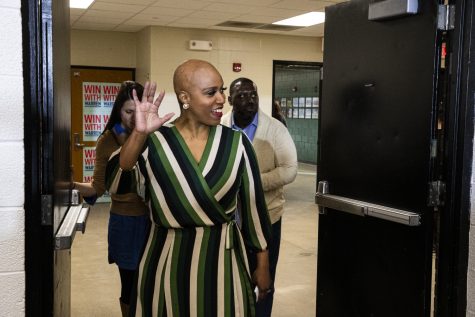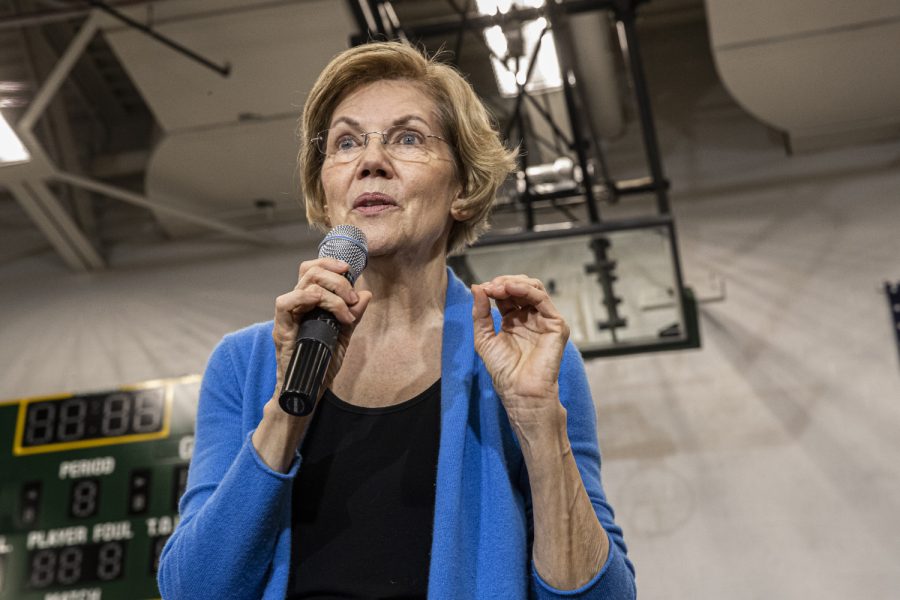‘Another E-word: electable’ Warren’s closing argument is that she can win, bring other Dems on board
In an interview with The Daily Iowan, Elizabeth Warren said she is closing her case to Iowans by emphasizing that a woman is electable, citing women activism in the midterm elections and dissolved campaigns that’ve coalesced around the Massachusetts senator.
Sen. Elizabeth Warren speaks at a campaign event at West High School in Iowa City on Saturday, February 1, 2020. With the Iowa Caucuses happening in two days, Warren stopped to give a last minute pitch to Iowa voters.
February 1, 2020
Introducing Elizabeth Warren at a rally in Iowa City Monday night, Rep. Ayanna Pressley, of Massachusetts, described Warren to the crowd of about 900 by the campaign’s count, with a couple of E-words.
“I know I like to talk about how empathetic she is, but let me give you another E-word — electable,” Pressley said.
Warren is leaning heavily into her argument that a woman can win just days ahead of the caucus, as well as that she can build the biggest coalition with a progressive vision.

Rep. Ayanna Pressley introduces Elizabeth Warren at a campaign event at West High School in Iowa City on Saturday, February 1, 2020. With the Iowa Caucuses happening in two days, Warren stopped to give a last minute pitch to Iowa voters. (Tate Hildyard/The Daily Iowan)
In an interview with The Daily Iowan Warren said she could win in November, saying she wanted to dispel any notion that a woman couldn’t win against President Trump.
She cited historic numbers of women elected to office in the 2018 midterm elections. Iowa sent the state’s first two female U.S. Representatives to Washington two years ago.
“Part of it is I just want to make sure we’re not playing on a playing field that says, ‘Oh, can we really trust this to a woman?’ The answer is the guys have lost a lot more than the women have,” Warren said.
Warren also emphasized in the interview with the DI that she wanted to build party unity before the nomination-race was over.
“But the other half of this is about ‘what are we going to run on out there to pull in everybody from our party?’” She went on to ask.
She pointed to her talking points about corruption and bringing down drug prices as policies that appeal to working and middle class people of both parties.
“I talk about a government that works great for those at the top and not much for anyone else,” she said. “It is a message that everybody in America gets. When I talk about the influence of money and Washington. Everybody nods, they get it.”
However, some party activists, especially on the left flank, are concerned about fracturing between supporters of Warren and Sen. Bernie Sanders.
Warren and fellow Sen. Bernie Sanders had several tense exchanges over whether Sanders told her in a private meeting that a woman couldn’t beat Trump. This was a change from the course of the last year — both candidates had joined in defending progressive policies in debates, such as Medicare for All and eliminating student-loan debt.
The two candidates’ campaigns have been sparring over an overlapping bloc of progressive Iowans. A mid-January Des Moines Register/Iowa Poll, showed that 44 percent of Sanders supporters said Warren is their second choice; and a plurality of Warren’s supporters, 31 percent, said Sanders is their second pick.
The poll also showed that Warren led the field with likely caucus-goers’ second choices — 16 percent said Warren was their second choice for president. In the Iowa caucuses, supporters in a camp that isn’t viable (reaching 15 percent of support), must realign on a second reshuffling, making a second choice important with four candidates bunched at the top of current polls. Twelve percent of poll respondents named Sanders for their second pick.
Warren deflected a chance to criticize Sanders in the interview with the DI, when asked about why progressive Iowans should support her rather than Sanders, saying that the two had always been close friends.
“I’m not here to knock anybody else. I’m just here to talk about why I’m running,” Warren said.
As the field winnows, her campaign has picked up several high-profile endorsements from previous candidates and some supporters who backed someone else for the Democratic nomination before dropping out, bolstering her argument that she can bring in Democrats who rallied for other campaigns.
Julián Castro, who dropped his bid for president Jan. 2, announced his support for Warren four days later — Jan. 6, and has been campaigning with her for the past month.
Earlier this week, Johnson County politicos Sue and former Democratic state Sen. Bob Dvorsky announced they’d back Warren for the nomination after Kamala Harris dropped her bid in early December.
They led a chant to open Warren’s Saturday afternoon rally rousing the crowd to recite back “It’s time for a woman in the White House.”
“I have people right now are working for me and trying to help me get elected here in Iowa who still have a Cory sticker on the back of their phones,” Warren said in the interview. “And you know what, that’s just fine. Because this is part of bringing our voices together.”
Some likely Iowa Democratic caucusgoers are still making up their minds between the two senators.
One Iowa City resident, Carol Adderley, 60, said she was split 50/50 on supporting either Warren or Sanders. She came out to see Warren in person, which boosted her opinion of the Massachusetts senator, and would see Sanders on Sunday before making her final decision.
“It’s funny because I’ve never been indecisive before,” Adderley said. “In 2016 it was Sanders,…it was when there was hardly anybody out there I was like ‘Oh, this is my guy.’ Years ago, my first time in Iowa, I caucused for Jesse Jackson. Like it’s always been so clear to me.”
She said she felt Sanders aligned more closely with her views on pacifism, and talked more aggressively about addressing economic disparity. She said she felt that Warren’s background lent her authenticity with calling for anti-corruption policies and addressing class inequalities. Warren often says on the campaign trail that her father worked as a janitor and she got a four-year teaching degree on a debate-team scholarship.
Adderley also said she thought Warren seemed adept and better at working with those in government to achieve her policies than Sanders.
“This was a strong influence this was a push upward for Warren. And I’ll just have to see what happens with Sanders,” she said.



